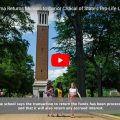
An Alabama judge declined to block a new state law prohibiting smokable drugs made from hemp.
In 2018, Congress passed the federal Farm Bill legalizing cannabis plants low in THC for use in textiles like hemp rope or cloth. THC is the main psychoactive substance in marijuana, and health experts warn the drug poses serious risks.
Instead of using hemp for textiles, manufacturers have found ways to extract and refine the small amount of THC in the plants. Doing this on a commercial scale means they can produce a lot of THC to infuse into drinks, candies, e-cigarettes, and other products.
As a result, state and federal policymakers have pushed back against these dangerous drugs.
The U.S. Food and Drug Administration has said that federal law prohibits hemp-derived THC in food products, and states like Massachusetts, South Dakota, and California have prohibited THC made from hemp.
In 2023, Arkansas passed Act 629 by Sen. Tyler Dees (R – Siloam Springs) and Rep. Jimmy Gazaway (R – Paragould) to prohibit THC made from industrial hemp. Family Council supported that good law, and the legislature voted to pass it. Act 629 spent nearly two years tied up in court, but in June the Eighth Circuit issued a decision letting the state enforce this good law.
Earlier this year lawmakers in Alabama passed a similar measure — House Bill 445 prohibiting “smokable hemp products” in the state. Companies that profit from hemp sued to block the law, but on Monday the judge presiding over the case declined to block the law. The decision tracks with other court rulings that affirm states can restrict or prohibit drugs made from hemp.
We have written for years how THC has been linked to everything from heart disease and cancer to stroke, mental illness, and birth defects.
The Oregon Liquor and Cannabis Commission recently tested 51 samples of industrial hemp flowers as part of the commission’s “Operation Clean Leaf” initiative. All 51 samples contained more THC than federal law allows. Authorities also said the vast majority of hemp products were sold without proper age verification, and that some were tainted with pesticides.
And public health data across America has shown drugs like the ones made from hemp routinely send kids to the emergency room and prompt parents to call poison control centers.
These drugs may be many things, but “harmless” simply is not one of them.
Articles appearing on this website are written with the aid of Family Council’s researchers and writers.




